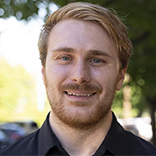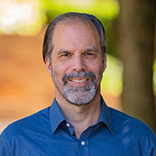Fred Hutch Living Tobacco-Free Services
Phone: 206.606.7517
We can meet with you in person or remotely, whichever you prefer. This service is provided to all current Fred Hutch patients, caregivers and family member
Deciding to quit tobacco is an important first step towards better health. But quitting for good can be hard without support.
At Fred Hutchinson Cancer Center's Living Tobacco-Free Services, our experienced tobacco cessation (quitting) specialists first listen to understand the unique challenges you face when it comes to quitting. Then, we work with you to find the right combination of support and resources you need to achieve your goal.
We offer a variety of medications proven to help manage nicotine-withdrawal symptoms, as well as tools to manage stress, strategies to break the tobacco habit and information that can help you quit.
“Fred Hutch provides world-class cancer treatment, but there is still no more important decision for your health than quitting tobacco. But for many people, that's hard. I’m proud that we offer comprehensive tobacco cessation services to all Fred Hutch patients and families.”
— Matthew A. Triplette, MD, MPH, Pulmonary Specialist
What Happens at Your First Appointment
At your appointment, you will meet with a tobacco cessation specialist. You will discuss your unique challenges to quitting tobacco, and your counselor will talk to you about resources available through Living Tobacco-Free Services, such as:
- Nicotine-withdrawal medications. If you are interested in medications, we offer nicotine replacement therapy patches, gum and lozenges, and we can work together to find the ones that are best for you.
- Stress management. If you smoke or use other types of tobacco to manage stress or deal with other emotional issues, we can offer alternate approaches that will preserve and improve your health. For example, we can suggest automated text reminders and online resources and classes designed to help you cope with stress. And we can discuss the possibility of talking with your provider about helpful medications and/or talk therapy.
- Creating new habits. We can help you design an individualized tobacco quit plan that considers your specific concerns, routines, triggers and time frame for quitting. We can help you find strategies and develop skills to break the tobacco habit, bounce back from a slip and become a comfortable and confident former tobacco user.
- Educational resources and materials. We can give you written educational materials about other resources for quitting tobacco. For example, we offer information about the benefits of stopping tobacco use when you receive a cancer diagnosis and during treatment.
After Your Visit
After your initial appointment, you are welcome to contact us as often as you like to receive support for becoming tobacco-free. Our goal is to help you become a comfortable, confident nonsmoker in a time frame that works for you.
“It’s never too late to stop tobacco use. Our program is here for you along every step to becoming tobacco free. We have the tools and resources to help you get to where you would like to be with your tobacco use in a kind, supportive and non-judgmental environment.”
— Brandon Omernik, MS, Certified Tobacco-Treatment Specialist
Join Quit2heal
If you want to quit smoking, but don’t want to meet with a Fred Hutch tobacco cessation specialist, you may be interested in Quit2Heal. Quit2Heal is a smoking cessation smartphone app that we have developed. Currently, we are recruiting study participants. The study is online and the app is free. If you join, you will receive:
- Tools to cope with urges to smoke
- A guide to quitting smoking
- Help with staying motivated
- Up to $210 for filling out three follow-up surveys and doing mailed saliva smoking status tests at 3, 6 and 12 months
Learn more about Quit2Heal
Frequently Asked Questions (FAQs)
Smoking is the cause of more than 80 percent of lung cancers, and it increases the risk of more than a dozen other cancers, including cancers of the mouth, larynx (voice box), pharynx (upper throat), nose and sinuses, esophagus (food pipe), liver, pancreas, stomach, kidney, bladder, cervix and bowel, as well as one type of ovarian cancer and some types of leukemia. There is also some evidence that smoking could increase the risk of breast cancer. Smokeless tobacco causes oral cancer, esophageal cancer and pancreatic cancer.
- A better chance of successful treatment
- Improved quality of life
- Reduced risk of secondary cancers
- Easier breathing
- Faster recovery from treatment
- Fewer and less serious side effects from all types of cancer treatment, including surgery, chemotherapy and radiation therapy
- Longer survival
- Lower risk of infection
- More energy
- 20 minutes after quitting: Your blood pressure and pulse return to normal.
- Eight hours later: Nicotine, carbon monoxide and oxygen levels in your blood begin to return to normal.
- Two days later: Your lungs start to clear, and your sense of taste and smell begin to return.
- At three days: Breathing is easier, and your energy level increases.
- Between two and 12 weeks: Your circulation improves, and exercise gets easier.
- Between three and nine months: Breathing problems, coughing, shortness of breath and wheezing improve.
- At five years: Your risk of having a heart attack falls to about half that of a smoker.
- At 10 years: Your risk for lung cancer falls to about half that of a smoker. You have the same risk of a heart attack as someone who has never smoked.
Your Care Team
Meet the caring, dedicated people who take care of you and your family at Fred Hutch.
Tobacco Cessation Specialists

Brandon Omernik, MS, CTTS

Anthony Woody, MPH, CTTS, NCTTP
Care Team
The Living Tobacco-Free Services team is made up of experts from a variety of specialties within Fred Hutch.
Pulmonogist
A pulmonologist is a physician who specializes in preventing and treating lung cancer and other respiratory diseases such as asthma and chronic obstructive pulmonary disease (COPD).
Tobacco Cessation Specialist
Tobacco cessation specialists are professionals with the skills, knowledge and training to provide effective, evidence-based support for tobacco dependence. They are experts at helping patients, caregivers and family members develop personalized quit plans to reach their tobacco-free goals.